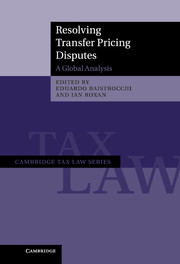Book contents
- Frontmatter
- Contents
- List of figures
- List of tables
- List of contributors
- Acknowledgements
- The Golden Bridge: analytical table of cases by topics in the OECD Guidelines
- Table of Cases
- Abbreviations
- Part I The context of transfer pricing disputes
- Part II North America and Europe
- Part III Asia Pacific
- Part IV BRIC Countries
- Part V South America, Middle East and Africa
- Part VI Conclusion
- 21 Transfer pricing dispute resolution: the global evolutionary path (1799–2011)
- 22 Resolving the resolution of transfer pricing disputes: global trends and divergences
- Index
22 - Resolving the resolution of transfer pricing disputes: global trends and divergences
from Part VI - Conclusion
Published online by Cambridge University Press: 05 November 2014
- Frontmatter
- Contents
- List of figures
- List of tables
- List of contributors
- Acknowledgements
- The Golden Bridge: analytical table of cases by topics in the OECD Guidelines
- Table of Cases
- Abbreviations
- Part I The context of transfer pricing disputes
- Part II North America and Europe
- Part III Asia Pacific
- Part IV BRIC Countries
- Part V South America, Middle East and Africa
- Part VI Conclusion
- 21 Transfer pricing dispute resolution: the global evolutionary path (1799–2011)
- 22 Resolving the resolution of transfer pricing disputes: global trends and divergences
- Index
Summary
Developments and divergences
The development of transfer pricing rules and dispute resolution processes around the world reflects the fact that countries' tax systems develop at different times and at different rates, and that they share experiences with each other through organisations such as the OECD, the IMF, the World Bank, the United Nations and the European Union. Problematic transfer prices are a response by taxpayers to differences between tax systems that affect the allocation of taxing rights between countries. So it comes as no surprise to find countries developing similar approaches and following similar paths to transfer pricing. This observation does, however, risk obscuring some important divergences.
Divergences in the nature of transfer pricing standards
The first is in the nature of the standards that are used to deal with transfer pricing. The choice of standards is commonly seen as being between the traditional strict arm's length standard (ALS) and formulary apportionment. This reflects the two methods that have attracted attention in the United States. Avi-Yonah suggests in Chapter 3 that these approaches are merely ends of a spectrum. The material gathered by the country contributors suggests that the position is in fact more complicated.
- Type
- Chapter
- Information
- Resolving Transfer Pricing DisputesA Global Analysis, pp. 884 - 891Publisher: Cambridge University PressPrint publication year: 2012



